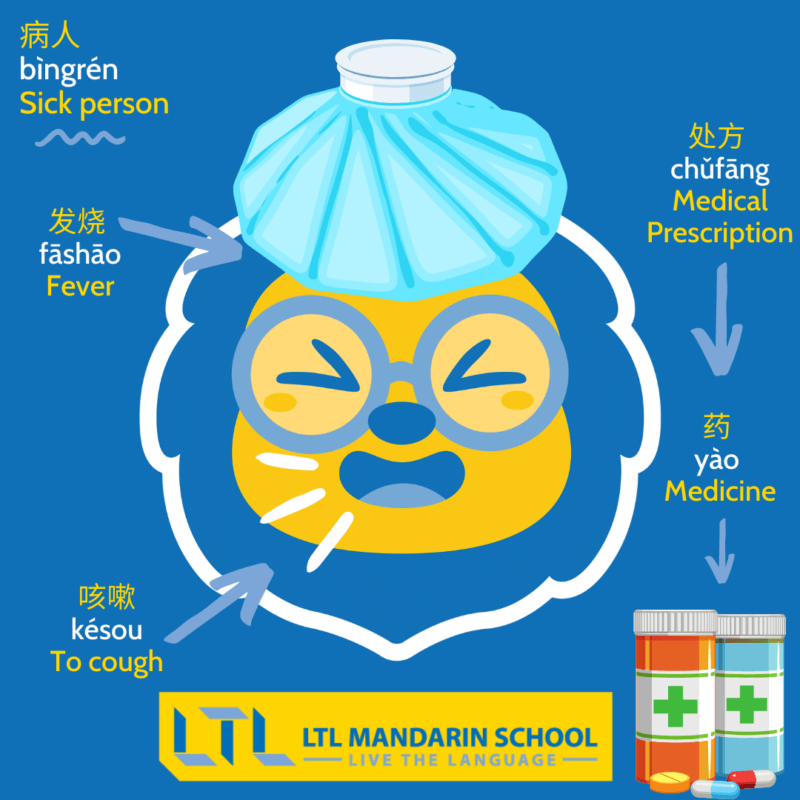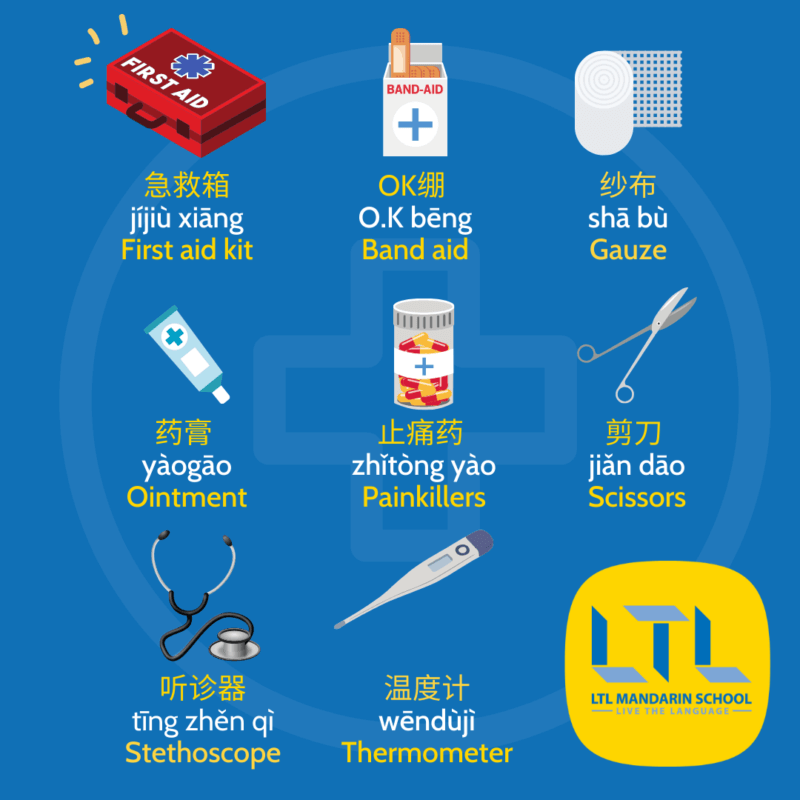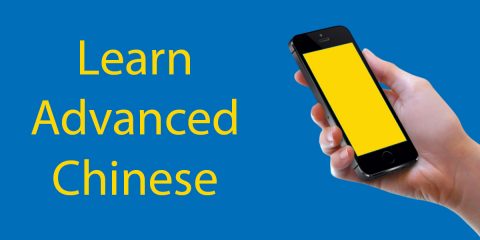How to Describe One’s Symptoms in Chinese?

This is probably one thing foreigners dread the most whilst in China, or in any country for that matter: having health issues and having to describe their symptoms in Chinese.
Not only are we already sick and not in our right mind, but we have to use some medical vocabulary to describe what’s wrong with our health in Chinese!
It’s the same issue if we are accompanying a friend to see the doctor and they cannot speak, you are in charge of describing what’s wrong.
No time or energy to check Pleco for your symptoms in Chinese?
Fear no more, we made a list of the most common diseases and symptoms for you to learn and avoid some very stressing situations.
You’ll also learn some words about injuries and the first aid kit 👇
Health in Chinese – General Medical Terms
Health in Chinese – Illnesses & Symptoms
Health in Chinese – Common Injuries
Health in Chinese – First Aid Kit
Health in Chinese – Inside the hospital
Health in Chinese – Hospital Departments
Health in Chinese – FAQ’s

How to Talk about Allergies in Chinese 🌻 Your Complete Guide
Guide to Allergies in Chinese Spring is a wonderful season. The long, dark, winter months are behind us. We are ready to enjoy the rebirth of nature. The days are starting to get longer and it starts to feel warmer….
Health in Chinese – General Medical Terms
Let’s dive right in!
If you are unwell or experiencing symptoms 症状 zhèngzhuàng of a potential illness, you become a 病人 bìng rén, a sick person.
If your condition requires you to go to the hospital 医院 yī yuàn or clinic 诊所 zhěn suǒ, you become a 患者 huàn zhě (patient).
Doctors 医生 yī shēng and nurses 护士 hù shi will take care of you so you can get back to your usual self in no time, and you’ll probably go out of your appointment with a medical prescription 处方 chǔ fāng for some medicine 药 yào.
- Sick person – 病人 bìng rén
- Patient, sufferer – 患者 huàn zhě
- Hospital – 医院 yī yuàn
- Clinic – 诊所 zhěn suǒ
- Doctor – 医生 yī shēng
- Nurse – 护士 hù shi
- Medical prescription – 处方 chǔ fāng
- Medicine – 药 yào
Have you ever been to the dentist in China? Katie and Campbell from LTL Beijing did! See for yourself how it went:
Health in Chinese – Illnesses & Symptoms
First of all health in Chinese, or being healthy is 健康 jiànkāng.
You become a 病人 when you develop a 疾病 jíbìng, a disease or sickness, and start to get various symptoms 症状 zhèngzhuàng.
You probably heard a lot about viruses 病毒 bìngdú, and how contagious 传染 chuánrǎn they are.
To avoid people catching them, doctors can inoculate 接种 jiēzhòng a vaccine 疫苗 yìmiáo.
- Disease, sickness – 疾病 jí bìng
- Symptoms – 症状 zhèngzhuàng
- Virus – 病毒 bìng dú
- Contagious, infect – 传染 chuán rǎn
- Inoculate, vaccinate – 接种 jiē zhòng
- Vaccine – 疫苗 yìmiáo
- Allergy – 过敏 guò mǐn
- Asthma – 哮喘 xiào chuǎn
- Common cold – 感冒 gǎn mào
- Diarrhoea – 腹泻 fù xiè
- Flu – 流感 liú gǎn
- Varicella – 水痘 shuǐ dòu
Mental health in Chinese is 精神健康 jīngshén jiànkāng
Unless we know our body very well or have experienced it before, it is always best to consult a doctor to get the appropriate treatment.
If you ever find yourself in China, having to explain your symptoms or your friend’s, here’s a list of the most common symptoms in Chinese:
| English | Hanzi | Pinyin |
|---|---|---|
| Allergy | 过敏 | guò mǐn |
| Asthma | 哮喘 | xiào chuǎn |
| Blurred vision | 视力模糊 | shìlì móhu |
| Burping, burp | 打饱嗝 | dǎ bǎogé |
| Common cold, catch a cold | 感冒 | gǎn mào |
| Constipation, be constipated | 便秘 | biànmì |
| Cough, to cough | 咳嗽 | ké sou |
| Cramp, have a cramp | 抽筋 | chōujīn |
| Cyst, have a cyst | 囊肿 | nángzhǒng |
| Dehydration, be dehydrated | 脱水 | tuōshuǐ |
| Diabetes | 糖尿病 | táng niào bìng |
| Diarrhoea | 腹泻 | fù xiè |
| Dizzy, feel dizzy, to faint | 昏厥 | hūn jué |
| Fatigue | 疲惫 | píbèi |
| Fast heartbeat | 心跳过速 | xīntiào guòsù |
| Feel bloated | 胃胀 | wèi zhàng |
| Fever | 发烧 | fāshāo |
| Hair loss, lose hair | 脱发 | tuōfà |
| Hallucination, to hallucinate | 幻觉 | huànjué |
| Headache | 头痛 | tóu tòng |
| Hearing difficulties | 听觉障碍 | tīngjué zhàng’ài |
| Heartburn | 烧心 | shāoxīn |
| Hiccup | 打嗝 | dǎgé |
| Hypertension | 高血压 | gāo xuèyā |
| Indigestion | 消化不良 | xiāohuà bùliáng |
| Inflammation, inflamed | 发炎 | fā yán |
| Insomnia, have trouble sleeping | 失眠 | shīmián |
| Itch, itchy | 痒 | yǎng |
| Loss of appetite | 食欲不振 | shíyù búzhèn |
| Migraine | 偏头痛 | piān tóu tòng |
| Nauseated, to feel nauseated | 恶心 | ě xīn |
| Nosebleed | 流鼻血 | liú bíxiě |
| Numbness, feel num | 麻木 | mámù |
| Rash, have a rash | 出疹子 | chū zhěnzi |
| Shiver, to shiver | 寒战 | hán zhàn |
| Shortness of breath | 气短 | qì duǎn |
| Sneeze, to sneeze | 打喷嚏 | dǎ pēntì |
| Snore, to snore | 打鼾 | dǎ hān |
| Sore throat | 喉咙痛 | hóulóng tòng |
| Spasm, convulsion | 痉挛 | jìng luán |
| Stomach ache, have an upset stomach | 胃痛 | wèitòng |
| Suffocate | 窒息 | zhì xī |
| Sweat | 出汗 | chū hàn |
| Swell, to be swollen | 肿 | zhǒng |
| Vomit, to vomit | 呕吐 | ǒu tù |
| Unconsciousness, to be unconscious/in a coma | 不省人事 | bù xǐng rén shì |
| Weight loss | 体重减少 | tǐzhòng jiǎn shǎo |
| Weight gain | 体重增加 | tǐzhòng zēngjiā |

Health in Chinese – Common Injuries
This is something we obviously do not wish to anyone, but it’s always good to put this vocabulary out there, in case it’s needed.
If you ever find yourself in an accident 事故 shìgù, you’ll probably suffer injuries 受伤 shòushāng.
Your injuries will hurt 疼 téng, and the pain 痛 tòng might be too much to handle, so better go to the 医院 see a 医生 and get some 药。
- Accident – 事故 shì gù
- Ache, pain – 痛 tòng
- To hurt – 疼 téng
- Suffer injuries – 受伤 shòu shāng
- To be poisoned – 中毒 zhòng dú
- Stab, puncture – 刺伤 cì shāng
- Blister – 水泡 shuǐ pào
- Bone fracture – 骨折 gǔ zhé
- Bug bite – 虫咬 chóngyǎo
- Burn – 烧伤 shāoshāng
- Cut, wound – 伤口 shāng kǒu
- Electric shock – 电击 diàn jī
Health in Chinese – First Aid Kit, 急救箱 jíjiù xiāng
Helping someone in distress is already very stressful, so doing it in a foreign language is even more!
Let’s say you find someone 不省人事 bù xǐng rénshì unconscious. You first need to check their breath 呼吸 hūxī and pulse 脉搏 màibó to verify this person is still breathing and the heart still pumping.
Depending on the situation, you can go find a first aid kit 急救箱 jíjiù xiāng in the nearby shops or houses. If the situation seems serious, always ask for help.
TOP TIP – Check the emergency numbers of the country you are travelling to before your arrival. If something happens, you’ll immediately know how to ask for help.
- Bandages – 包扎 bāo zhā
- Band Aid – OK绷 O.K bēng
- Cleansing wipes – 清洁湿巾 qīngjié shī jīn
- Disposable sterile gloves – 一次性无菌手套 yícì xìng wú jūn shǒutào
- First aid – 急救 jí jiù
- Gauze – 纱布 shā bù
- Ointment – 药膏 yào ɡāo
- Painkillers – 止痛药 zhǐtòng yào
- Safety pins – 安全别针 ānquán biézhēn
- Scissors – 剪刀 jiǎn dāo
- Sticky tape – 胶带 jiāodài
- Thermometer – 温度计 wēndùjì
- Tweezers – 镊子夹子 nièzi jiázi
- To wrap up – 绷带 bēng dài
BONUS – Stethoscope in Chinese is 听诊器 tīng zhěn qì.

Health in Chinese – The Hospital
Sometimes accidents happen, we eat something bad, catch fever, break a bone or our appendix suddenly hurts.
No matter the country you are in, you need to be hospitalised 住院 zhùyuàn and maybe even need a surgical intervention 手术 shǒushù.
Whilst you are comfortably set up in a sickroom 病房 bìngfáng, the doctor and nurses will come to examine you 检查 jiǎnchá and maybe even run some blood tests 验血 yànxiě to find out what’s wrong.
- To be hospitalised – 住院 zhù yuàn
- Surgery – 手术 shǒu shù
- Sickroom, ward – 病房 bìng fáng
- To examine – 检查 jiǎn chá
- To leave the hospital – 出院 chū yuàn
- Outpatient service – 门诊 mén zhěn
- To anaesthetise – 麻醉 má zuì
- To inject, injection – 注射 zhù shè
- Results – 结果 jié guǒ
- Wheelchair – 轮椅 lún yǐ
- Surgeon – 外科医生 wài kē yī shēng
Here’s a list of tests the doctor might prescribe:
| English | Hanzi | Pinyin |
|---|---|---|
| Blood pressure | 血压 | xuè yā |
| Blood test | 验血 | yàn xiě |
| Heart rate | 心率 | xīn lǜ |
| MRI | 磁共振成像 | cí gòng zhèn chéng xiàng |
| Ultrasound | 超声 | chāo shēng |
| Vision test | 视力检查 | shì lì jiǎn chá |
| X-Ray | X光 | X guāng |
Health in Chinese – Hospital’s Departments
Unlike many countries, China doesn’t have private practices and every health issue must be checked at the hospital.
Depending on your health issue or the specialist you’d like to consult, you need to find the right department.
Chinese hospitals are generally large you can easily get lost!
In case you are going to a regular Chinese hospital and there is no English translation, here’s a list of hospital’s departments to help you navigate the place:
| Department | Hanzi | Pinyin |
|---|---|---|
| Cardiology | 心脏病科 | xīnzàng bìng kē |
| Dentistry | 牙科 | yákē |
| Dermatology | 皮肤科 | pífū kē |
| Emergency Room | 急诊室 | jí zhěn shì |
| Endocrinology | 内分泌科 | nèifēnmì kē |
| Gastroenterology | 胃肠病科 | wèi cháng bìng kē |
| Gynecology and obstetrics | 妇产科 | fù chǎnkē |
| Hematology | 血液科 | xiěyè kē |
| Immunology | 免疫科 | miǎnyì kē |
| Maternity department | 产科 | chǎn kē |
| Medical department | 内科 | nèi kē |
| Neurology | 神经病科 | shénjīngbìng kē |
| Ophthalmology | 眼科 | yǎnkē |
| Orthopedics | 骨科 | gǔkē |
| Pediatrics | 儿科 | érkē |
| Pneumology | 肺病科 | fèibìng kē |
| Radiology | 放射科 | fàngshè kē |
| Surgical department | 外科 | wàikē |
| Traumatology | 创伤科 | chuàngshāng kē |
| Urology | 泌尿外科 | mìniào wàikē |
There we are, we hope you learned a little bit more vocabulary related to health in Chinese, especially the symptoms in Chinese, so even if you get unlucky you’ll be more relaxed explaining your situation with doctors in China.
If we missed anything, feel free to leave a comment below and we’ll add it to the list.
FREQUENTLY ASKED QUESTIONS
How to say Symptoms in Chinese?
Symptoms in Chinese is 症状 zhèngzhuàng.
How to say Headache in Chinese?
Headache in Chinese is 头痛 tóu tòng.
How to say Fever in Chinese?
Fever in Chinese is 发烧 fāshāo.
How to say Vaccine in Chinese?
Vaccine in Chinese is vaccine 疫苗 yìmiáo.
How to say Doctor in Chinese?
Doctor in Chinese is 医生 yī shēng.
What if I’m sick in China?
If you get sick in China, don’t worry, there’s plenty of hospitals and pharmacies.
If you are in a one-tier city, you’ll even be able to go to an international hospital and find doctors that speak English.
Before departure, we suggest you check with your health insurance if they cover the costs of a hospitalisation.
Want more from LTL?
Want to learn Chinese from the comfort of your own home? Then our 24/7 online Chinese lessons might be the thing for you.
We offer a 7 day free trial to all new online students where you can study Mandarin 24/7.
Come and check it out free of charge and see what you think!
If you wish to hear more from LTL Language School why not join our mailing list?
















 Hi, my name is Manuel! I am from Spain and I am a Student Advisor at LTL. I’m now based at our Seoul School after living 3 years in Taipei.
Hi, my name is Manuel! I am from Spain and I am a Student Advisor at LTL. I’m now based at our Seoul School after living 3 years in Taipei. Hi, my name is Mojca! I am from Slovenia in Europe and I work as a student advisor at our Shanghai school.
Hi, my name is Mojca! I am from Slovenia in Europe and I work as a student advisor at our Shanghai school.




